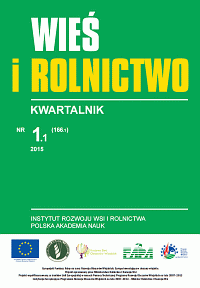Znaczenie rolnictwa rodzinnego w procesach rozwoju. Wnioski i rekomendacje
Family farming in the development process. Conclusions and recommendations
Author(s): Philippe Bonnal, Jean-Michel Sourisseau, Bruno Loscha, Jacques Marzin, Pierre-Marie BoscSubject(s): Economy
Published by: Instytut Rozwoju Wsi i Rolnictwa Polskiej Akademii Nauk
Keywords: family farming diversities; conventional (classic) development trajectory; apparent converging; re-definition of agricultural policies; różnorodność rolnictwa rodzinnego; konwencjonalna trajektoria rozwoju; pozorna konwergencja; redefinicja kanonu polity
Summary/Abstract: Family farming is the dominant form of agricultural production in the contemporary world. It fulfills various important economic (food security, employment, etc.) as well as other (social, environmental, etc.) functions. It is an extremely differentiated phenomenon resulting from various interrelationships among such factors, as: access to resources, investment potential, self-consumption, relations between farms and the market, families’ vocational activities, differentiation and specialization of production, substitution of family work-force by capital, the goals for the functioning of the farm as well as results of actions. Modern and intensive family farms in highly developed countries (Western Europe, North America, Australia) are a result of a so-called conventional (classic) way of modernization and account for only 2% of all family farms existing in the contemporary world. This implies that the result of a so-called “industrial revolution” in agriculture is not observed all over the world. It also means that the repetition of this “classic” way of modernization resulting in the growing level of productivity and a structural diversification in agricultural economy seems to be a impossible goal in the coming decades. This can be attributed, to the effects of demographic pressure, food shortages and a lack of financial resources especially in Asia and Africa. Basing on such a diagnosis the author suggests a re-definition of global policies focused on family farming. There should be a more integrative and multi-sector approach taking into consideration such issue as: diversity of the family farming phenomenon, multi-functionality of family farms, treating them as an important type of a public good, control of market mechanisms and speculation issues, strengthening of cooperation and risk reduction activities in agriculture as well as the relation between the family and the farm. Such an approach requires new institutional frameworks for family farming and for agricultural policies to take into consideration territorial and regional differences.
Journal: Wieś i Rolnictwo
- Issue Year: 166/2015
- Issue No: 1(1)
- Page Range: 23-44
- Page Count: 22
- Language: Polish

